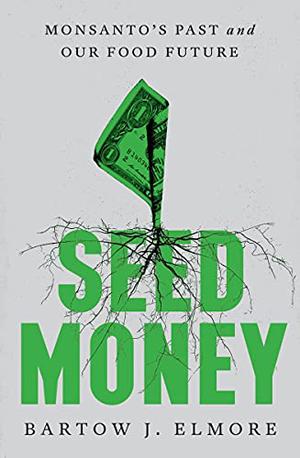
Monsanto’s Past and Our Food Future”
By Bartow J. Elmore
W. W. Norton, 2021
400 pages, hardcover, $30
If you think you know Monsanto — the biochemical company that has become synonymous with genetically modified monoculture and toxic herbicides — think again. Bartow J. Elmore’s “Seed Money: Monsanto’s Past and Our Food Future” is a history of the corporation, its blunders and how it became the black hat of modern agriculture. Elmore’s detailed and compelling book shines light on the hidden stories in the corners of Monsanto’s past and the messy reality of its present.
Through Elmore’s masterful storytelling, “Seed Money” is as much a character drama as it is a corporate exposé. Elmore details, through painstaking research, the known motivations of the key players in Monsanto’s founding that led to ethically questionable business decisions throughout the biochemical company’s many phases. For example, he digs up personal letters showing how Edgar Queeny, early CEO of Monsanto and the son of its founder, wrestled with his love for the outdoors and the emerging science about the environmental damages wrought by Monsanto chemicals.
Elmore doesn’t just give the star treatment, though. He focuses on many stakeholders in Monsanto’s history, from the employees, like James Ray Boggs who sued the company for compensation for medical issues caused by exposure to chemicals, to cooperative extension agents, like Mark Loux who decried the company once the science became more revealing.
All this focus on the human element of the company’s history drives home one point most clearly: Monsanto isn’t an unnamed figure of evil hovering over American agriculture. It is a product of people who sometimes lost sight of what was right in front of them once they had committed themselves to a certain goal.
The most affecting parts of the story perhaps are good intentions that paved Monsanto’s road to Hell. As the company began its foray into herbicides and seed development, it saw itself initially as an environmental vanguard with the ultimate goal of reducing the need for pesticides and the damage that agriculture had wrought upon the Earth’s soils. Elmore writes about how Robert B. Shapiro, the company’s CEO in the mid-1990s, was once considered a sustainability guru. He would cut a particularly tragic figure, if it weren’t for all the money he made off of his flimsy claims.
The book brings us right up to the present day, finishing eerily in the middle of the COVID-19 pandemic as Monsanto’s new parent company Bayer tries to figure out what to do with the cursed child they have taken on. (Another irony that Elmore notes: Monsanto, once positioned as a necessary evil to keep the United States from relying on German manufacturing, is now owned by a German company.) The narrative of Monsanto’s history is so ironic that it’s almost literary, especially in the hands of a master prose smith like Elmore.
Elmore’s “Seed Money” is at once a necessary piece of history and a page-turning drama. If Monsanto is the villainous presence haunting modern agriculture, “Seed Money” is its must-read origin story.
Sam Schipani, Bangor, Maine
